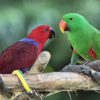Charles Darwin speculated that language might have had its origins in singing and now linguists from MIT are taking that theory a step further by proposing that human language could be a grafting of two communication forms found in the animal kingdom. Writing in Frontiers in Psychology, the scientists suggest that human language is a […]








